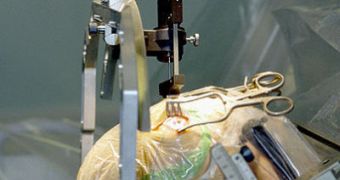Tourette's Syndrome is an inherited neuropsychiatric disorder, characterized by patients having numerous motor tics, and at least one verbal tic. The disease begins its development during childhood, and can reach a stage where it causes significant embarrassment to the patient. A sufferer can curse without meaning to, for example, and in situations where that is totally inappropriate. Now, doctors believe they may have found a method of counteracting the disorder, through a therapy known as deep-brain stimulation (DBS), PhysOrg reports.
“Our findings hold promise for helping people with severe Tourette syndrome, who are in need of new treatment options to improve their quality of life” University of Birmingham expert Andrea Cavanna, MD, says. The English scientist is also the author of a new study detailing the therapy's merits, published in the October 27 issue of the respected scientific journal Neurology. Finding a solution for TS is very important, because the emergence of the disease is also associated with the onset of medical conditions such as the obsessive-compulsive disorder (OCD), depression, anxiety or the attention deficit hyperactivity disorder (ADHD).
It's estimated that more than two million Americans suffer from Tourette's Syndrome at this point. Some of the most common symptoms include head and neck jerking, excessive blinking, grimacing, and so on. The reason why TS patients also develop other disorders is still unknown, but some theories hold that there may be a genetic connection between these conditions. In other words, they may be different manifestations of the same underlying issue, a group of neuroscientists believes. The English science team wanted to learn if DBS was effective in quenching these manifestations.
“Despite having only 15 patients in this study, it is the largest to date on the effectiveness of deep brain stimulation as a treatment for Tourette syndrome. The results showed that all 15 people who were assessed after two years' treatment experienced improvements in disabling tics and neurological problems, which is encouraging,” Cavanna explains. Participants in the study reportedly experienced 52 percent less tics related to TS in the follow-up period of the study.
“Unfortunately three patients from the original group of 18 were no longer part of the study at follow up and this limits the ability to generalize our findings. More research needs to be done to confirm that deep brain stimulation is a safe and effective treatment for Tourette syndrome,” the expert adds. Test subjects also reported a 26 to 32-percent drop in the number of symptoms associated with OCD, anxiety and depression.

 14 DAY TRIAL //
14 DAY TRIAL //